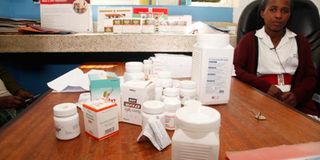Refugee inflow causing ARVs shortage in Kisoro

A nurse at Kisoro Regional Referral Hospital. The hospital is overwhelmed by numbers that management is forced to do selective treatment of HIV positive patients. PHOTOS BY RACHEL MABALA
What you need to know:
- For health workers at Kisoro Regional Referral Hospital, the decision to give treatment depends on one’s identification.
- This, they blame on rampant stock-outs and influx of patients from neighbouring countries.
Charles Hakuza, 54, is a volunteer at the HIV clinic at Kisoro Regional Referral Hospital. He has lived with HIV for 35 years. He is a former worker at Crown Bottling Company where he worked as a machine operator.
When he became weak in 1991, he decided to go back to his home in Kamuli Village, Kisoro District where he has been receiving his ARVs. He has been a volunteer at the hospital for eight years. Hakuza encourages and advises other patients on good feeding and how to cope with HIV.
After every two months, Hakuza gets a refill of the ARVs from the hospital. He is one of the patients that share drugs with refugee patients from Congo and Rwanda.
According to Esther Mahoro, a nursing officer at Kisoro regional referral hospital, they usually experience stock-outs for ARVs but they go to nearby health centres that may be having the drugs.
“We have had stock-outs but we usually go to smaller facilities like health centre III and IVs to ensure that our patients do not miss out,” she says.
Prevalence
The prevalence of HIV in Kisoro District is averagely 8.2 per cent but with truck drivers being pointed at as fuelling the spread of HIV. This is because they stay for as long as their cargo is cleared and during their stay, they engage in sex with commercial sex workers who are another most at risk population in the area.
The prevalence of HIV among truck drivers is as high as 15 per cent. Other populations at risk include but not limited to boda boda men, bar attendants and the Batwa communities.
Kisoro Regional Referral Hospital has a total of 4,421 patients on treatment under HIV care but also serves patients from Rwanda and Congo as some of them go to the hospital as refugees.
Rising numbers
According to Abel Bizimana, the LC V chairperson Kisoro District, many people, especially from Congo, come to Uganda for fear of their lives because of the insecurity in their country.
He says, “We have a refugee problem here and every month, between 800 - 1,100 refugees from Congo come here due to the insecurity in their country,” he says.
Some of the refugees, he says, come with chronic illnesses such as HIV/Aids which must be treated from the regional referral hospital. This, therefore, implies that locals compete with refugees over scarce medical resources such as ARVs.
“The stock-out of ARVs at the referral hospital is due to the fact that local people must share the resources with the refugees. The government normally plans for the population of the people here and does not cater for the refugees,” Bizimana says.
Desperate times...
There was a time, according to Wilson Tumugyenda the chief administrative officer Kisoro District when the hospital did selective treatment for patients to ensure that citizens got treated first using the National IDs but some citizens would be left out since not all citizens have received the said identification cards.
Bizimana also highlights that sometimes funds do not reach them on time thereby delaying the whole process. “The problem is that government has failed to trust its own people yet we have the capacity to do our own things. Every money that is dispensed has strings attached and when it is availed, it usually comes in late, so we experience shortages in the services at the hospitals.”




